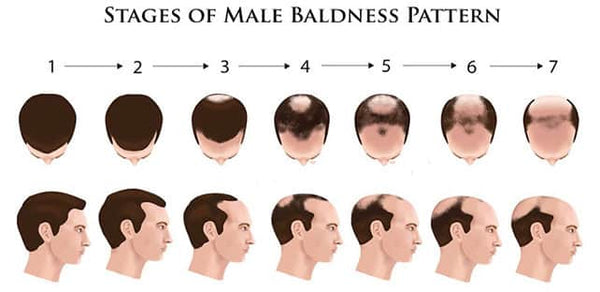
What Causes Hair Loss In Men & What’s The Cure For It?
What Causes Hair Loss In Men & What’s The Cure For It?
Many men worry about going bald and some of you may already be seeing the start of a receding hairline and thinning crown. Then the questions that usually arise is why is this happening and what is causing my hair to bald? And the most important question of all, is what can be done to stop it?
Continue reading to understand why you may be going bald and find out some of the things you can try out to help prevent it from getting worse.
Why do men go bald?
The most common reason men go bald is because of a hereditary condition called androgenic alopecia, which is more commonly referred to as male pattern baldness. This is the most common type of hair loss in men and it is more than likely 50% of all men over the age of 50 will end up being affected by male pattern baldness according to the National Library of Medicine.
What causes male pattern baldness?
Male pattern baldness is caused by genetics such as having a family history of baldness. It is associated with the male sex hormone called androgens which have many functions, including regulating hair growth. There is a growth cycle which each hair strand sticks to for you to have a thick head of hair. However, when you have male pattern baldness this important growth cycle weakens, and the hair follicles shrink which produce short, finer strands of hair. Eventually the growth cycle for each hair stops completely and no new hair grows in its place. This type of hair loss is usually permanent once it starts. However, these days it could be cured with the help of modern day science as you will see further into the article.
If you are concerned that male pattern baldness runs in your family you can book an appointment with your GP. They will perform a medical history and tests to rule out other health conditions which could be related to your baldness, such as fungal conditions which cause your hair not to grow or any nutritional disorders. They will also check that your hair loss isn’t caused by any new medications you are taking or any underlying health conditions, such as thyroid conditions.
You will notice a typical pattern of your hair loss when it comes to male pattern baldness. The two most common being:
- Hair thinning at the top of the head and around the temples. This can leave a “crown of laurel” outline of hair around the sides and back of the head.
- Hair receding backwards from the front hairline which you will commonly know as a receding hairline.

Credit: Getty Images.
What age do men normally start losing hair?
Don’t feel stressed about the fact that your hair is thinning. In fact, you can probably take some comfort in the fact that you’re not alone. According to research completed by the American Hair Loss Association:
- Around 25% of men who have hereditary male pattern baldness start losing their hair by the age of 21.
- Around 66% of men experience some degree of hair loss by the age of 35.
- Around 85% of men will have considerably thinner hair by the age of 50.
What are other causes of hair loss in men?
While male pattern baldness is the leading cause of baldness in men, it is not the only condition that causes hair loss. Male pattern baldness has a pretty obvious balding pattern and doesn’t come with any other symptoms like the other causes we are about to go through (see image above). These conditions below can cause varying degrees of hair loss, some permanent and others, thankfully, are reversible.
Telogen effluvium is caused by excessive shedding of hair that happens a few months after some sort of BIG shock to the system, such as a stressful event. This type of hair loss can be triggered by surgery, an accident, illness, drastic weight loss, and psychological stress. The good thing is your hair can grow back after 2-6 months.
This is a condition that causes your body’s immune system to wrongly attack healthy hair follicles which leads to hair loss. Alopecia areata causes small patches of hair to fall out of your head as well as other hair growing on your body. With this condition it is normal to find bald spots in your beard, in your eyebrows and in your eyelashes.
When you do not have optimal levels of iron and other essential nutrients you sacrifice good health, as well as good healthy hair growth. Vitamin D, proteins, along with a host of other vitamins in your diet are important when it comes to maintaining healthy hair. A deficiency in any of these key nutrients can cause you to lose an excessive amount of hair than is normal.
Temporary hair loss can be caused by using certain medications such as chemotherapy drugs, acne medications, immunosuppressants, etc. The good news is once you stop taking these medications it is almost certain that hair growth will likely resume.

Credit: Pinterest.
Is there a cure for permanent hair loss?
There are a handful of true cures out there to fix male baldness. Some are medications that you topically rub into your head while others are more invasive and much more drastic treatments. To help cure hair loss you can:
Two medications that have been proven to vastly improve baldness in men are finasteride and minoxidil. Finasteride comes in pill form and is only available by prescription whereas minoxidil is topical treatment that can be bought over the counter. You will start seeing the benefit of this treatment after about 6 months so you must be patient. However, with drugs like minoxidil, you must continue using them for the rest of your life, otherwise your hair will stop growing back.
Low-level laser therapy is a newer treatment option that has very promising results. It is used to improve circulation in the scalp which in turn stimulates the hair follicles. There were encouraging results in a 2013 study where 41 men suffering from male pattern baldness had a 39% increase in hair growth!
There are two common types of hair transplant procedures that are great for hair loss, the follicular unit transplant (FUT) and the follicular unit extraction (FUE). FUT’s involve cutting skin grafts which are then inserted into the head where there is no hair growth. FUE’s involves a surgeon taking individual healthy hair follicles out of the scalp, making small holes where the hair isn’t growing, and reinserting them. Prices may vary depending on the skill-level of your surgeon.

I’ve noticed early signs of hair loss. What can I do to help prevent further hair loss?
We always suggest you take pre-emptive measures to help prevent hair loss before it happens or just as you notice the first signs of thinning. This way you can potentially stop any further hair loss from happening.
This can easily be achieved by:
The hair products you use on your hair can deeply affect its health and growth. It’s best to avoid products filled with chemicals such as SLS, certain bad alcohols and parabens and lean towards something more natural and nourishing. We highly recommend using NO GUNK hair products as they are formulated to be nourishing for both your hair and scalp, and only contain all-natural ingredients which promote healthier hair. By using a product that focuses on hair health you will see some great side effects such as having thicker, stronger and healthier hair and consequently find that it helps prevent further hair loss.
According to a 2016 study researchers concluded that regular scalp massages could lead to thicker, healthier hair. The study involved men receiving a 4-minute scalp massage every day for 24 weeks. At the end of the study, it was found that men had thicker hair than at the start. An additional study in 2019 using 340 participants supported these findings which followed the instructions of doing a twice-daily scalp massage which also improved hair loss.
A study conducted by Harvard University proved that stress is linked to hair loss. Therefore finding your way of destressing is crucial to healthy hair. Experts suggest finding ways to laugh, practising meditation, light exercise such as going for a walk or doing whatever it takes for you to unplug, wind down and relax.
A balanced diet is key to healthy hair growth especially since we’ve already explained that nutrient deficiency can cause hair to stop growing or fall out. You’ve heard the saying healthy diet, healthy body. Well that also applies to your hair. You need to make sure your diet is rich in Vitamin A, B, C, D and E as well as iron, zinc and protein. This will help your hair stay lucious and healthy which in turn will help prevent hair loss.
If you found this article and its tips and information helpful please drop a comment below and tell us all about it!








Zheelana Cottam
Author